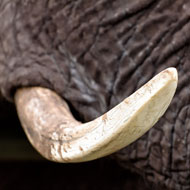
Programme comes under pressure from Born Free
In view of government plans to introduce a total ban on ivory sales in the UK, the BBC is considering whether to stop showing the material on the Antiques Roadshow.
Speaking to The Guardian, a spokesperson for the show said: “In the light of recent developments in the UK and China with regard to the trade in antique ivory, the Antiques Roadshow is currently reviewing the way it will, in future, approach items of antique ivory that are brought in by members of the public for appraisal.”
They added: “We’re looking forward to finding out more about the government’s plans for new legislation around the trade in antique ivory and will review our approach in the coming months.”
The Antiques Roadshow has come under pressure in recent days from international wildlife charity Born Free. Its co-founder Virginia McKenna accused the programme of being 'out of touch’.
“With the introduction of its proposed ban, the UK will be implementing much stricter measures than those that are specified within the CITES convention,” she said. “The BBC must surely align its policy with UK regulations, as well as reflecting increasing recognition that the trade in ivory products must end if we are to secure a future for elephants.”
Around 20,000 African elephants are believed to be slaughtered by poachers for their ivory every year. The UK is the world’s biggest exporter of ‘legal’ ivory in the form of older, worked items.
Last month, a government consultation on plans to introduce a total ban on ivory sales in the UK came to an end. This included a discussion on whether to prohibit the import and export of ivory to and from the UK.
A decision is expected later this year, but if the ban does come into force, most ivory products will have no commercial value in the UK.



 The Veterinary Medicines Directorate (VMD) is inviting applications from veterinary students to attend a one-week extramural studies (EMS) placement in July 2026.
The Veterinary Medicines Directorate (VMD) is inviting applications from veterinary students to attend a one-week extramural studies (EMS) placement in July 2026.